 By Staff By Staff
August 31st, 2023
BURLINGTON, ON
The Alliance for a Liveable Ontario commissioned Environics Research to gauge public perceptions about the cause of the housing crisis facing Ontario, the preferred solution and whose opinion people trust.
The results show there is overwhelming support for governments to be actively involved in getting housing built in existing towns and cities where services already exist. Ontarians do not want housing on the Greenbelt and farmland.
The Key Takeaways were:
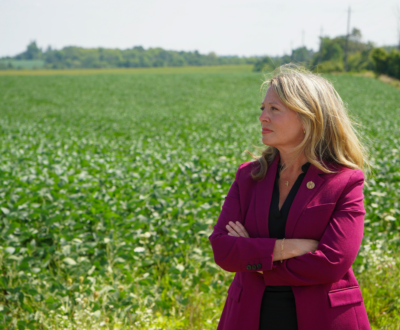 Leader of the provincial opposition Marit Stiles does not think a soybean field inside the Greenbelt is the place to build houses when there is already enough land elsewhere. 83% of Ontarians hold the view that there is no need to build housing on the Greenbelt and farmland to solve Ontario’s housing challenges because there is enough land already available in existing towns and cities. This view mirrors the findings of multiple reports (see here) that show more than enough land has been set aside within existing urban boundaries to build over 2 million homes.
88% of Ontarians think the government should get actively involved in housing solutions, focusing on lands where services already exist.
41% of Ontarians either trust no one or are not sure about who to trust when it comes to the housing issue.
Civil society groups are trusted by 33%.
The Premier is trusted by 10%, local Councils by 10%, and housing developers by 6%.
Without trust very little will get done

 By Pepper Parr By Pepper Parr
August 30th, 2023
BURLINGTON, ON
It is a stinker.
It is 190 pages long that was produced quite quickly. Set out below is a portion of the document. A deeper reading and some analysis will follow.
J. David Wake, Integrity Commissioner said:
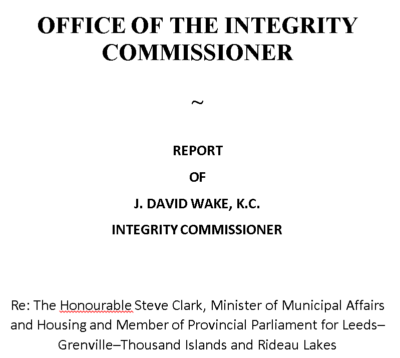 The matter went before cabinet on November 2, was approved, and after a short 30-day public consultation period, the Greenbelt changes took effect. The matter went before cabinet on November 2, was approved, and after a short 30-day public consultation period, the Greenbelt changes took effect.
The resulting public outcry over this move led to a complaint filed with me on December 8, 2022.
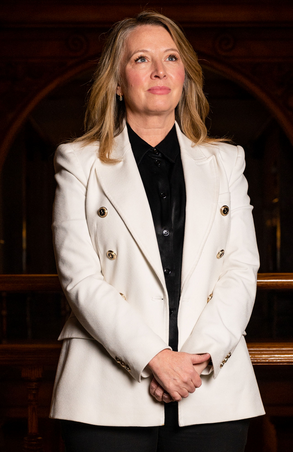 Marit Stiles: Leader of the NDP opposition at Queen’s Park In that complaint, Marit Stiles, Member of Provincial Parliament for Davenport, asked for my opinion on whether Minister Clark contravened sections 2 (Conflict of Interest) and 3 (Insider Information) of the Members’ Integrity Act, 1994. Making or participating in a decision that furthers another person’s interest improperly is prohibited under section 2 of the Act. Communicating information that may be used to further another person’s interest improperly is prohibited under subsection 3(2) of the Act.
My inquiry was limited to determining whether Minister Clark’s role in the decision to remove certain properties from the Greenbelt contravened the Act.
In the course of this inquiry, my staff and I received evidence from 61 witnesses plus Minister Clark. We reviewed maps, documents, text messages, emails, briefing decks and other documents totalling thousands of pages. Much of the evidence was gathered through the exercise of my powers under section 33 of the Public Inquiries Act, 2009 to summons witnesses and to have them produce relevant documents. I was satisfied with the level of cooperation shown by all witnesses and their counsel in this inquiry in making themselves available and producing documents.
The evidence paints a picture of a process marked by misinterpretation, unnecessary hastiness and deception. It shows that Mr. Amato advised Minister Clark to “leave it with me” as he embarked on a chaotic and almost reckless process that I find led to an uninformed and opaque decision which resulted in the creation of an opportunity to further the private interests of some developers improperly.
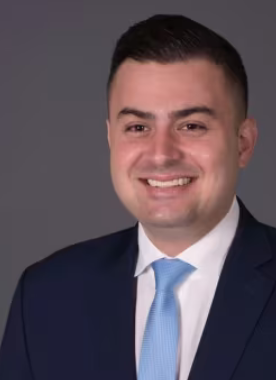 Ryan Amato: Chief of staff to the Minister of Municipalities and Housing resigned earlier this week. Mr. Amato gathered packages of materials from developers keen to have their lands removed from the Greenbelt. When submissions for Greenbelt removals were met with “send me more information” instead of only a polite acknowledgement, this was a subtle change in the messaging that was noticed quickly by the ever-sensitive antennae in the developer network. Certain members of the development community seized the opportunity and provided Mr. Amato with detailed maps, files and reports supporting the removal of various properties from the Greenbelt. There was no public call for submissions, consultations or assessments, but those developers who caught wind of this change – and sought access to Mr. Amato – obtained the opportunity for their lands to be removed.
Based on the evidence, of the 15 properties that were removed from the Greenbelt or redesignated, Mr. Amato was involved in the selection of 14. This report outlines the evidence gathered on how each of the 15 properties came to be included in the cabinet submission.
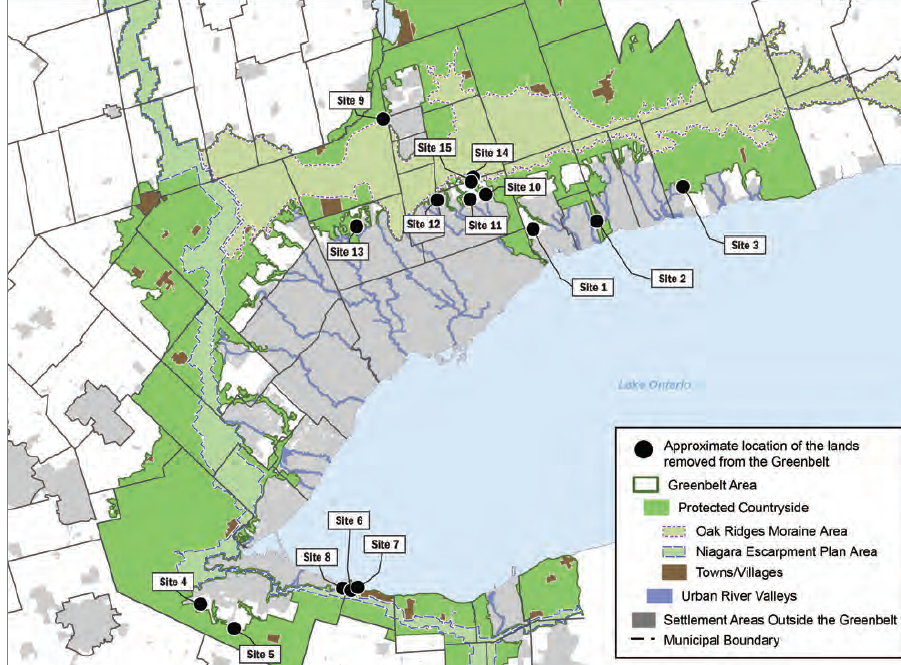
The public servants believed that Mr. Amato was providing direction and/or approvals from the minister and the Premier’s Office. But by his own admission and that of other witnesses, Mr. Amato was operating largely alone and undirected.
I find that Mr. Amato was the driving force behind a flawed process which provided an advantage to those who approached him. It was unfair to those landowners who had an interest in seeing their lands were removed and who were unaware of the potential change to the government’s Greenbelt policy. The argument that they could be considered at a later time must not be particularly comforting to them now and since the December removals, no action has been taken to consider any other properties for removal from the Greenbelt.
It is incumbent on the minister, however, to supervise his staff. Members cannot hide from accountability under the Act where, through undue carelessness or inattention, they fail to oversee important policies or decisions in their offices. I find that the minister made three critical decisions which contributed to the improper result of the process.
 Portions of the Mandate Letter the Premier sent to Steve Clark, Minister of Municipal Affairs and Housing. 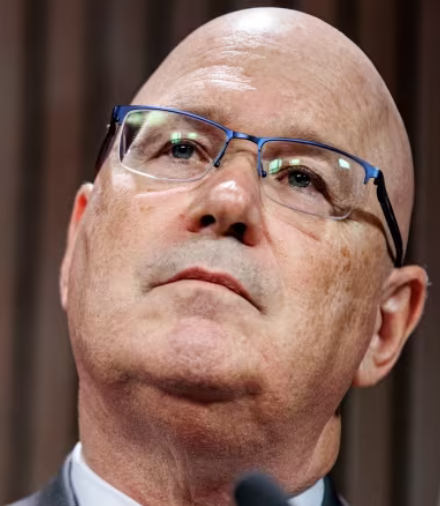 Minister of Municipalities and Housing Steve Clark First, Minister Clark misinterpreted the mandate letter’s timing for Greenbelt removals which led Mr. Amato to embark on a rushed process with unfortunate results.
Second, he made the decision to withdraw from the supervision and direction of this highly significant initiative within his ministry, leaving it to his recently appointed chief of staff who had never served in that capacity before and who was “drinking from a firehose” trying to grasp all of his new responsibilities.
Third, he made the decision to take the proposal to cabinet without having questioned Mr. Amato or the deputy minister as to how the properties had been selected for removal or redesignation.
Mr. Amato’s communications to developers must be attributed to Mr. Clark since I find that he failed to oversee an important initiative in his ministry which led to some developers being alerted to a potential change in the government’s position on the Greenbelt with the result that their private interests were furthered improperly.
During the inquiry, I encountered evidence that is relevant to mandates I have under other pieces of legislation, on which I have outlined and offered commentary as well as recommendations in this report.
Based on the evidence gathered in this inquiry, I conclude that Minister Clark breached sections 2 and 3(2) of the Act. Accordingly, I have recommended to the Legislative Assembly of Ontario that Minister Clark be reprimanded for his failure to comply with the Act.
While now public the Integrity Commissioner reports has to be presented to the government who can ignore it, accept the recommendation or decide to take a different approach.

 By Staff By Staff
August 30th 2023
BURLINGTON, ON
The Alliance for a Liveable Ontario (ALO) is now calling on the Auditor General and Integrity Commissioner to expand their investigations to include review of the many other decisions of the Minister’s Office at the Ministry of Municipal Affairs and Housing since July 2022. Such a review could help restore
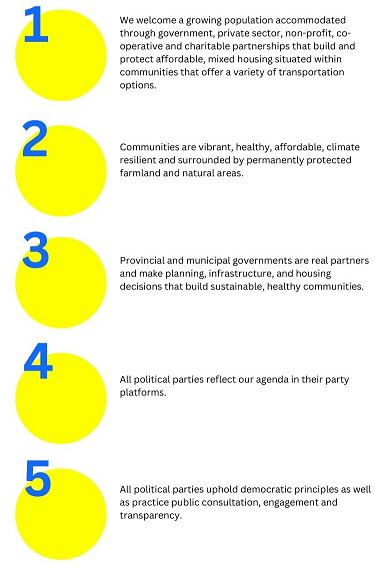 • The power of Conservation Authorities. Bill 23 compromises Conservation Authorities’ capacity to regulate development that negatively impacts wetlands, rivers or streams and to provide municipalities with guidance on preventing flooding. • The power of Conservation Authorities. Bill 23 compromises Conservation Authorities’ capacity to regulate development that negatively impacts wetlands, rivers or streams and to provide municipalities with guidance on preventing flooding.
• Municipalities’ capacity to address affordable housing. Under Bill 23 and Bill 97, the limitations on Inclusionary Zoning make it irrelevant to those most in need, and the Minister has the right to overturn any municipally-approved rental replacement bylaws.
• The funding needed to support development. Bill 23 reduced the amount of Development Charges and Parkland Dedication Fees municipalities may charge. The resulting lack of funds for necessary infrastructure is stalling progress on new developments.
• Local, democratic, sustainable decision-making. The Province overruled (Regional) Official Plans, forced urban boundary expansions, introduced ‘Strong Mayor’ powers and expanded the range of Ministerial Zoning Orders (MZOs).
A large display of public support is needed to justify further investigations. Please review the short ALO letter and, if you agree, please endorse the letter by 5pm, September 11, 2023 and pass it on to others who might be interested.
In a Special Report on Changes to the Greenbelt, the Auditor General found that
1. The process used to select sites for removal from the Greenbelt “was not transparent, fair, objective, or fully informed”,
2. “Direct access to the Housing Minister’s Chief of Staff resulted in certain prominent developers receiving preferential treatment”, and
3. “The owners of the 15 land sites removed from the Greenbelt could ultimately see a collective $8.3 billion increase to the value of their properties” [based on 2016 Municipal Property Assessment Corporation property values].
A large display of public support is needed to justify further investigations. Please review the short ALO letter and, if you agree, please endorse the letter by 5pm, September 11, 2023 and pass it on to others who might be interested.

 By Staff By Staff
August 30th, 2023
BURLINGTON, ON
Steve Clark, Ontario Minister of Municipal Affairs and Housing is sticking to his guns.
He was in Little Current on Manitoulin Island this morning to tell them about the over $1.6 million provided through the Social Services Relief Fund (SSRF) to help create three affordable housing units for seniors in the community.
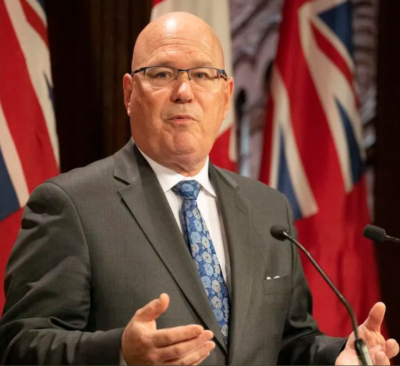 Minister of Municipal Affairs and Housing Steve Clark In partnership with the Government of Canada, the Ontario government is also providing $821,180 through the Ontario Priorities Housing Initiative to support the creation of another three units in this building.
Fielding Place is a brand-new senior’s facility with 12 units, including one-bedroom and two-bedroom units. Three out of 12 units are funded by the Social Services Relief Fund. Two of the units are fully accessible and each unit is equipped with kitchen appliances, air conditioning, and in-suite laundry. The units also have a private patio and ample storage. Residents will be close to waterfront parks, local shops, banking, and community activities.
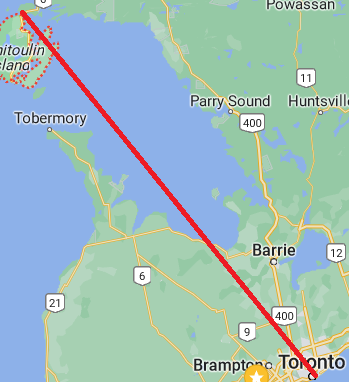 Things are cooler up north. The announcement gets the Minister out of town and away from Queen’s Park where the politics of the housing problem prevent people from seeing some of the small projects that serve smaller communities.
Donna Stewart, CAO, Manitoulin-Sudbury District Services Board put the decision in perspective: “It took us 24 years to make this a reality and we have finally succeeded in adding 12 affordable senior’s units to our portfolio.
Have you any idea how far from Queen’s Park Manitoulin Island actually is.?

 By Pepper Parr By Pepper Parr
August 30th , 2023
BURLINGTON, ON
Earlier this month we did a piece on Bill Kelly’s radio program on what was his last broadcast from CHML. A part of that program included a conversation between Kelly and John Best, Editor of the Bay Observer. The two have known and worked with each other for years.
Best made a comment on what media was like – and what it is like today. We set that out below and then write about how media is “managed” by the Communications department in Burlington.
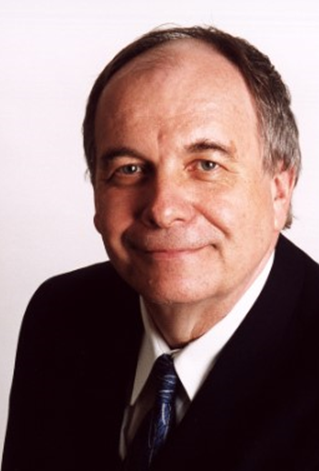 John Best, Publisher of the Bay Observer John Best: “But if we don’t have local news Bill, what we’re going to have is all these people in City halls cranking out press releases that we all get by the dozens: there will no longer be any kind of an observing filter. It’ll simply go from the PR people directly to the public, and at some point it will be taken as gospel.
“And that’s really dangerous. That’s almost Orwellian to guys like me that have worked around the media for most of our adult lives. The concern is that the answers are not readily at hand.
“There was a time when they were reporters. I mean, they were people that were employed to go out and get the story to talk to the newsmakers to report on this.
“But when newsrooms are decimated as they have been, especially as you say in some small markets with local news, the people that are left, and there’s not that many of them, have no choice but to simply, you know, reprint the press releases that the politicians or others are putting out.
“The few reporters that are left don’t have time to question – basically all they’re doing is repeating the spin that these people are putting on it. And that’s not good for the public. That’s not good for us to be informed and know what’s going on. There’s a valuable piece of that that’s starting to erode right now and I think we all need to be concerned about the implications of that.
“Reporters actually speak to people, to ask them questions and get answers and you can’t do it all by email, and text. It’s too impersonal and you don’t get to the truth. If you can’t look people in the eye when you’re asking them questions you probably don’t have a news story.”
The comments John Best made sum up what the Gazette has to deal with from the City hall communications department.
If I sent a note to a city staff member – I get an answer from the Communications people who offer to get me an answer.
There is rarely an opportunity to actually talk to a staff member. At a Performing Arts event recently I ran into a person I used to have lunch with – the person was always very responsive when questions were asked.
But at the Performing Arts event the comment was “I am not allowed to talk to you.” We once got the same from a member of Council. That one stunned me. When the Council member was running for office we met frequently and talked about his plans. He wrote two Opinion pieces for the Gazette.
That Council member turned out to be a major disappointment – there was hope when an election campaign was taking place but it didn’t take long for people to realize that there wasn’t much to the image – he ended up becoming a lap dog for the Mayor.
Council did formally recognize and support free press day. That was the equivalent of a Mayor who talked up her experience as a journalist but has yet to hold a wide open media event. Her preference is to appear on programs that will never ask her a hard question,
This approach to the managing of how the city decides to work with media comes right from the top. City Manager Tim Commisso determines what the policy is going to be.
He basically continued the practice that James Ridge had in place.
 While individual members of Council have their issues with Commisso – they have not taken any steps to open up the way the city hands out information. They like it the way it is. While individual members of Council have their issues with Commisso – they have not taken any steps to open up the way the city hands out information. They like it the way it is.
Some Councillors, early in their first term of office, were a bit forthcoming. One got into the practice of talking about matters that were discussed in closed sessions of council. This kind of thing is like icing on a chocolate cake for a reporter – but you have to be very very careful when you get this kind of information.
You don’t want to burn the source.
We work from the premise that an informed society can make informed decisions. People in Burlington do talk about what they don’t like – but they seem to need time to figure out what to do. Rarely does a candidate lose office after just one term; the exception would be Cam Jackson who was out the door after four years.
Burlington is in the process of going through a very significant change. There will be thousands of people who will live in apartments many of whom will use GO trains to get to where they work. Their involvement in local community events might turn out to be limited.
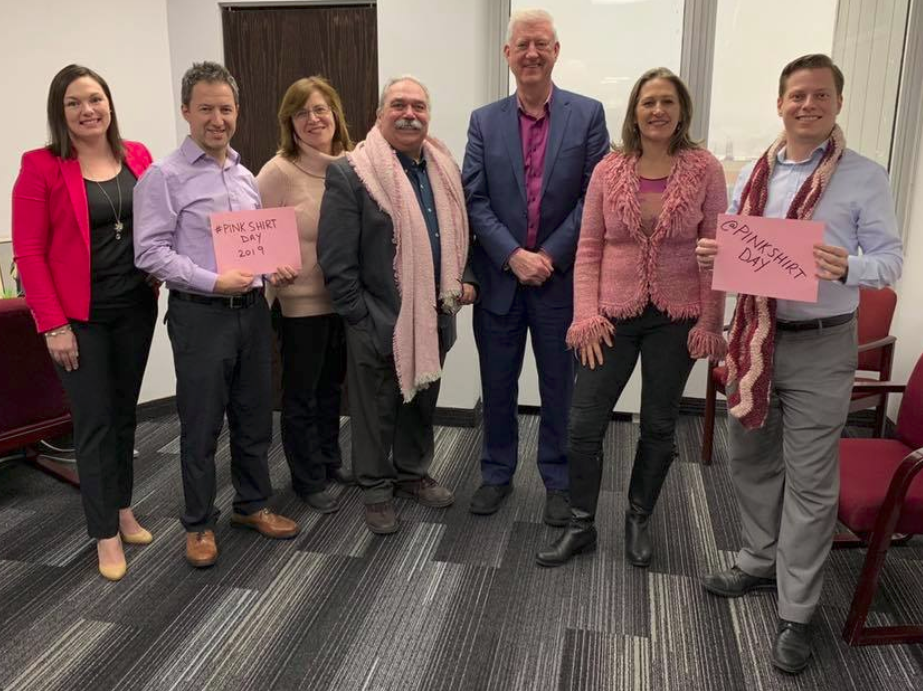 The current City Council Gifted leadership learns what drives a community; what people want and what they don’t want and has the communication skills to build bridges between the different points of view.
Burlington doesn’t have that kind of leadership and there is no one on the current council that shows signs of having the royal jelly.

 By Pepper Parr By Pepper Parr
August 29th, 2023
BURLINGTON, ON
We were doing some research on where the picture that was used in the “Can’t Afford Meed Ward” Facebook page – that we can’t seem to find and I ran across the article I did on the Meed Ward announcement that she was going to run for Mayor.

The picture that was used in the article was a picture I took at the event. It’s out there – anybody can find and use it. Link to that story is HERE
What was on Med Ward web sites and Facebook pages has been removed. The suspicion over there is that another candidate running for Mayor in the 2018 election was responsible for the posting.
It was a very short story – at the bottom there were 16 comments. They are set out below. How many of those people would say the same thing today ?

 By Pepper Parr By Pepper Parr
August 29th, 2023
BURLINGTON, ON
In a statement released by Leader of the Opposition Marit Stiles said
“This is not the first time a developer has used the Ford government’s “housing tools” for speculation and profit.
“In fact, a close contact of the Premier recently made windfall profits after getting special zoning orders to build on farmland with a strip of the Greenbelt running through it.
“This developer, Shakir Rehmatullah of Flato Developers, was on the guest list for the Ford family wedding and is closely connected with the Premier’s former right-hand-man Amin Massoudi.”
 The room where large expensive weddings take place. Fabulous location. The event took place at the Pearle Hotel and Spa which is part of the Bridgewater development in downtown Burlington.
“Yet, the government gave little to no response when that sale was made public by the Toronto Star.
“Earlier this year, prolific donor and another close contact of the Conservative Party, Silvio De Gasperis, who owns the historic Dominion Foundry Site, received an MZO to begin demolition of the site only to turn it into a parking lot.
“This closely connected developer continues to make profit while new housing is still nowhere to be seen, despite this government insisting that the MZO was issued to increase housing supply.”

 By Pepper Parr By Pepper Parr
August 29th, 2023
BURLINGTON, ON
The drip, drip, drip is becoming a gusher of public outrage causing Premier Ford to back track and begin looking for a way out of the mess his Minister of Municipal Affairs and Housing created.
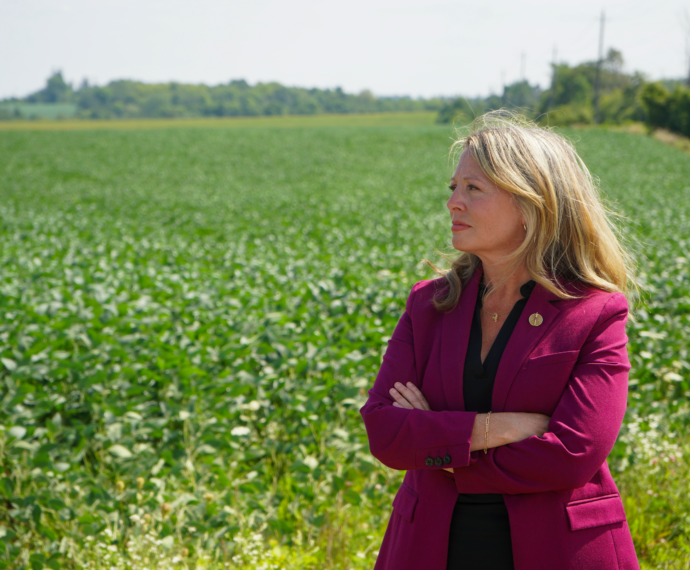 Leader of the Opposition Marit Stiles in a soybean field inside the Greenbelt Marit Stiles, Leader of the Opposition at Queen’s Park said: “Ford’s Conservatives are changing their tune simply because they got caught. Clearly, this is a government that has one set of rules for those with close connections to their party and a different set for everyone else. None of this is about housing. This government needs to recall the Legislature so we can restore all of these lands to Greenbelt protection now, and Ford needs to fire Minister Clark from Cabinet.”
Ford expressed concern earlier today that a company called Buena Vista Development is trying to sell 765 and 775 Kingston Road East in Ajax.
Those are two of the “sites that were selected as part of the land swap to build at least 50,000 new homes and grow the size of the Greenbelt,” the premier said in a statement.
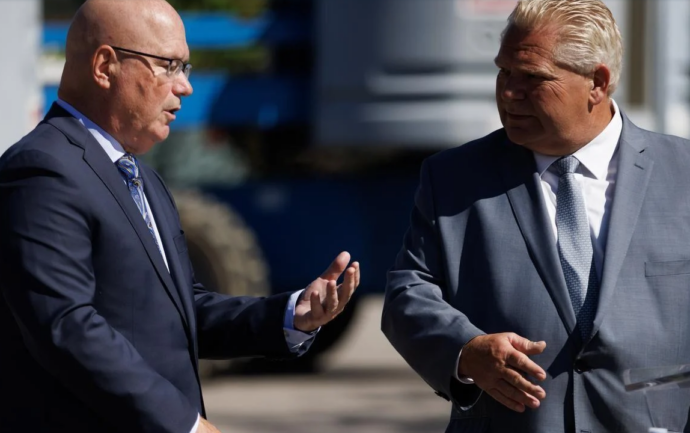 What do you make of that body language. Minister of Municipal Affairs Steve Clark communicating with Premier Ford. “At no point was the intention to sell disclosed to the government’s facilitator during active and ongoing discussions.
“This behaviour goes against everything that our government is doing to bring home ownership into reach for more people.
“In response, our government is exploring every option available to us, including immediately starting the process to put these sites back into the Greenbelt.”
In firing a salvo at the Ajax landowner, Ford is sending a signal to developers who have had their Greenbelt land rezoned.
“To the other property owners, you’re on notice: if you don’t meet our government’s conditions, including showing real progress by year end with a plan to get shovels in the ground by 2025, your land will go back into the Greenbelt,” the premier said Tuesday.
Officials from Buena Vista Development were not immediately available for comment.
CBC has reported the land at 775 Kingston Road East was purchased in June 2018 for $15.8 million and that the company’s main officer is Yuchen Lu, who resides in Fuyang, China.
Ford is doing his best to make it clear that if the land taken out of the Greenbelt was not developed – he said he wanted to see shovels in the ground by 2025 – then the land will revert to being part of the Greenbelt.
From a purely legal point that might be easier said than done – but that is some distance down the road. Road now the Premier is working 24/7 to save his government.
Public pressure works.

 By Staff By Staff
August 29th, 2023
BURLINGTON, ON
Rudi Denninger passed away on Friday at the Oakville Trafalgar Hospital.
No details yet on funeral arrangements.
There are five Denninger’s locations in the Hamilton Burlington markets.
Hundreds of young people in Burlington and Hamilton got their first part time jobs at Denninger’s stores.
Rudi Denninger’s recent passing marks the end of the beginning of the wonderful food empire he founded. As CEO of Denninger’s Foods of the World he moved the company into a leadership position in specialty food purveyors. Many other purveyors of food took advice from him. He was a strong patron and business leader in our community (Hamilton and Burlington). His specialty products and prepared meals are sold and distributed far beyond Denninger’s own stores.
Rudi invented many types of sausage including their best-selling Spinach Sausage. He was a big supporter of Joe Brant Hospital as well as a strong supporter of Rib Fest from the very beginning. Under his leadership, Denninger’s employed hundreds of young people for many of whom it was their first job.
His name will forever be part of the legacy he left us and we love.
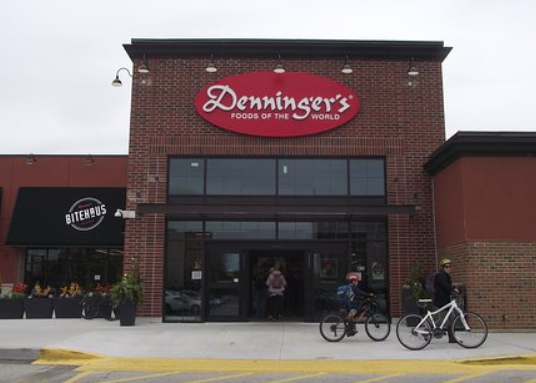

 By Staff By Staff
August 28th. 2023
BURLINGTON, ON
Halton Region is now accepting applications for the Building Safer Communities in Halton Grant, which will provide funding for community-based prevention and intervention programs that address gun and gang violence. The Region will distribute up to $2.4 million between January 1, 2024 and March 31, 2026 to eligible local organizations.
“Keeping children, youth and young adults engaged, healthy and safe are important steps to preventing involvement in crime and gun violence,” said Halton Regional Chair Gary Carr. “While Halton has a low rate of gun and gang violence, these issues cross municipal borders and local prevention and engagement programs are critical to keeping all communities safe. Public Safety Canada is funding this important initiative in Halton and across the country.”
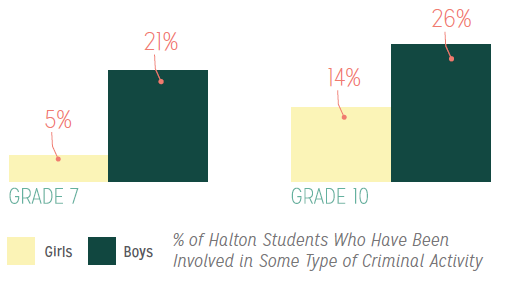 Keeping youth and young adults engaged, healthy and safe are important steps to preventing involvement in crime. In 2022, Public Safety Canada introduced the Building Safer Communities Fund, announcing investments of $250 million to help communities tackle the root causes of gun and gang violence across Canada. The Building Safer Communities in Halton initiative is part of Halton’s Community and Safety Well-Being Plan and aligns with the Region’s broader effort to work closely with local partners to keep the community safe and healthy.
Applications for the Building Safer Communities in Halton Grant will be accepted until September 22, 2023. To be eligible for the grant, organizations must:
- support children, youth and young adults (ages 6 – 29) in evidence-based prevention and intervention strategies;
- align with priority program types in application guidelines (e.g., counselling, harm reduction, supportive housing, etc.);
- align with priority themes in application guidelines (e.g., preventing and addressing human trafficking, developing and supporting positive coping skills, etc.);
- provide services to Halton residents;
- ensure equitable and inclusive service delivery to support diverse, equity-deserving or marginalized populations and;
- be incorporated as a non-profit organization, registered charity, or a First Nations, Metis or Inuit band.
The Region will be hosting three information sessions to help community organizations learn about the grant and the application process:
- Session 1: Wednesday, September 6, 10 a.m. to 12 p.m. (Virtual)
- Session 2: Thursday, September 7, 6 to 8 p.m. (Virtual)
- Session 3: Friday, September 8, 2 to 4 p.m. (In-person – Halton Regional Centre, 1151 Bronte Road, Oakville)
To apply for the grant or learn more, visit the Community Safety and Well-Being page on halton.ca. To attend a session, please register by emailing buildingsafercommunities@halton.ca. |
|
|

 By Pepper Parr By Pepper Parr
August 28th, 2023
BURLINGTON, ON
During the Minister of Education media event earlier today a reporter asked:
Will Ontario bring in policies like we’ve seen in New Brunswick and Saskatchewan to require that parents be informed if their children change gender identity at school?
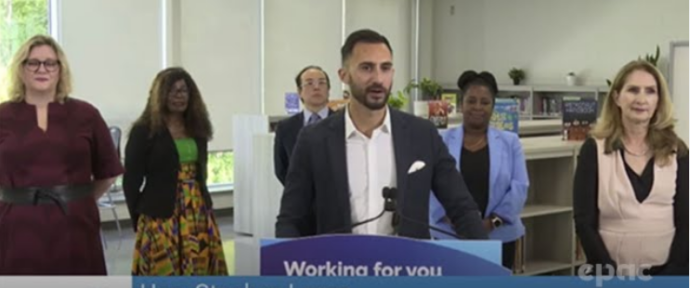 Minister of Education got tossed questions that needed delicate answers. He did Ok. Minister responds
Look, I think it’s important to note that every school must be safe for every child. I think we understand, though, that parents must be fully involved and fully aware of what’s happening in the life of their children. I mean, often there are health implications. And I think we have to respect the rights of parents recognizing that these can be life changing decisions, and I think parents want to be involved so that they can support their kids. And I think that’s a really important principle that we must uphold.
Reporter follows up with:
Are you going to require legislation ?
Minister
We’re simply making clear as a province that we believe parents should be fully involved fully aware of what’s happening to their children; these are significant changes and they have a right to know. And so we would expect school boards to be transparent with parents.
Reporter:
How do you respond to the criticism we’ve heard that it puts some LGBTQ kids at risk, where maybe they’re not, you know, their home environments, not a safe place for them to be out or to have a different gender identity?
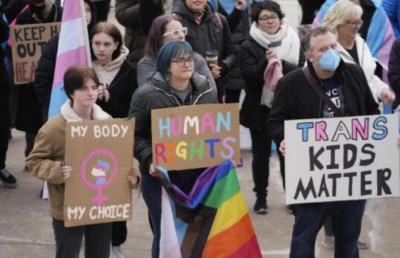 A transgendered person matters. It is a tricky question – there is no simple, clear cut answer. Minister
This is why lead with recognition. Safety must prevail the safety of the child both at home and school, for there are exceptional circumstances where there can be situations of potential harm to a child educators are well versed on exactly what to do and who to turn to. If they believe that child may be harmed for whatever reason or whatever circumstance – we will always safeguard the rights of children to be safe will always ensure that that is the case. Educators do amazing work in recognizing the signs and the changes in behaviour and energy and attitude.
They really do wear many hats and we’re grateful for what they do. But there’s a well-established protocol to ensure the safety of children and I have every confidence that what has been the case for many years will continue to be that they can leverage those that protocol if they believe something potentially could put the child at risk.
Is as an overarching value system, I really do believe that parents need to be fully aware, fully engaged in school boards and to be transparent with parents. I mean, they are the legal guardians. They love their kids. They want to be aware of what’s happening in the life of their children in their schools. And I think that that is really important that they know.
Reporter
Your position is that they should but there’s not a requirement to report or like anything like any directive like that from the Ministry of Education.
Minister:
School boards will have policies. I’m just affirming the provinces position on the matter quite clearly, which is parents have a right to know and we will respect parental rights. We think boards must do the same.

 By Staff By Staff
August 28th, 2023
BURLINGTON, ON
 If Region dissolved – what would the office space be used for?
Local paper suggests “Dissolution of Halton Region not ruled out.”
Details at this link;

 By Staff By Staff
August 28th, 2023
BURLINGTON, ON
As the country continues to face a unique set of circumstances this summer, Canadian Blood Services is urging everyone who can, to donate blood or plasma to help boost supplies.
Summer is already a difficult time for maintaining an ideal blood and plasma supply as donors are out of their normal routines. This year, however, the situation has been complicated by an unusual series of events, including floodings and devastating wildfires.
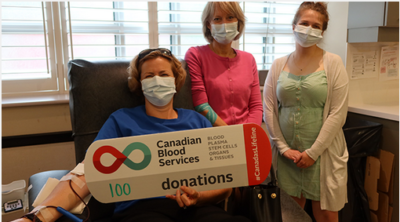 Many Canadians are 100 donations plus “We expected to see lower attendance in the summer months when regular donors take summer vacations, but the extraordinary natural events across the country presented unpredicted challenges for folks from coast to coast,” says Ron Vezina, vice president, public affairs. “Between heat waves and forest fires, torrential rains and flash floods, communities are strained, as people cope with the emergencies in front of them. Fewer people have been donating, but despite these circumstances patients continue to need vital donations of blood and plasma.”
Over the last week, Canadian Blood Services had to cancel over 300 donation appointments in the Kelowna area as the community grappled with devastating wildfires.
“Our hearts go out to the communities that have been impacted by the disastrous events this summer,” said Vezina. “Canadians are always prepared to do the neighbourly thing and lend a helping hand and so we’re asking folks across the country to help fill the gap. If you can safely visit a donor centre or a mobile event, please do so as soon as you can. Patients are counting on you.”
There are nearly 10,000 donation appointments that need to be filled across the country between now and Labour Day.
On average, every 60 seconds someone in Canada needs blood
Blood has a limited shelf life after collection. Donated blood can only be stored for up to 42 days, so it is vital that the donations are continually collected without interruption.
With the shifting landscape in how and where Canadians are accessing news and information online, the agency is asking everyone to help share the news that blood and plasma donors are needed.
“We’re asking everyone who can to please donate blood or plasma and to help spread the word, by inviting others to join them in donating. We need this important ask of Canadians to reach as many people as quickly as possible and are asking for help in sharing our message on social media. Follow us @CanadasLifeline. Your support gives reassurance to the patients who rely on donated blood or plasma,” said Vezina.
Book an appointment today. Same day appointments are available at many locations. To join the community of donors who play a vital role in patient care in this country, download the GiveBlood app, visit blood.ca, or call 1 888 2DONATE (1-888-236-6283) and book an appointment and share through your own social media networks.
About Canadian Blood Services
Canadian Blood Services is a not-for-profit charitable organization. Regulated by Health Canada as a biologics manufacturer and primarily funded by the provincial and territorial ministries of health, Canadian Blood Services operates with a national scope, infrastructure and governance that make it unique within Canadian healthcare. In the domain of blood, plasma and stem cells, we provide services for patients on behalf of all provincial and territorial governments except Quebec. The national transplant registry for interprovincial organ sharing and related programs reaches into all provinces and territories, as a biological lifeline for Canadians.

 By Staff By Staff
August 28th, 2023
BURLINGTON, ON
Clark was booed at one point during his remarks.
Minister of Municipal Affairs and Housing Steve Clark started off on a high note when he addressed municipal council members and staff at the annual AMO conference held in London Ontario.
“This is an exciting time for Ontario, Ontario, Ontario, Our province is leading the nation in job growth with more than 700,000 full time jobs created in the province since 2018.
“Over the last two and a half years Ontario has attracted more than $25 billion in investments in the auto and the electrical vehicle battery sector alone.
“These investments lay the foundation for a resilient Ontario with opportunities for every community to thrive. And let’s be clear, Ontario is thriving; last year alone our province welcomed nearly half a million permanent residents. This is exciting, but we know that our communities must have the proper tools in place to support growth.
“That’s why we recently introduced the community infrastructure and housing accelerator (CIHA) it’s a tool that allows municipalities in partnership with the province to speed up approvals for important projects like housing and hospitals, while increasing transparency and accountability.
“I encourage all municipalities to look into ways to use CIHA to support projects worthwhile projects in their communities.
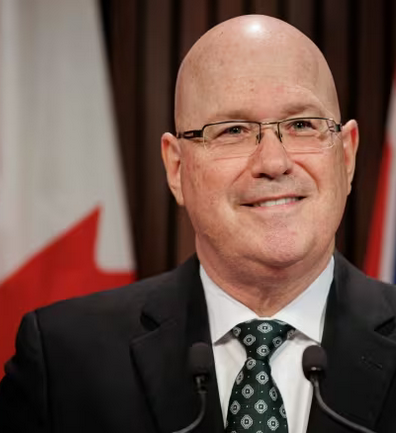 Minister of Municipal Affairs and Housing first announcing strong Mayor concept. “Our government has also taken decisive action to extend strong mayor powers to 28 municipalities that have committed to a housing target, helping these communities speed up delivery of key projects such as housing and infrastructure. And you all heard the premier yesterday as he announced the extension of strong mayor powers to an additional 21 municipalities provided that they commit on delivering on our provincially assigned housing targets.
“The premier also made a tremendous announcement in announcing our government’s new building faster fund that’s going to provide up to $1.2 billion over three years to help municipalities that are either on track to meet or hopefully to exceed their housing targets.
“This one will help municipalities pay for housing enabling infrastructure and related costs that support community growth. I want to assure you that our government will continue to look for solutions that help municipalities get more people into homes that meet their needs and their budgets.
“With that in mind, I’m announcing today that the government will be unveiling a slate of regional facilitators in Durham, Halton, Niagara, Simcoe County, Waterloo and York by September 11 of this year. These facilitators will be tasked with reviewing the structures that are in place in these fast growing areas to ensure that they’re up for the job in delivering efficient effective and accountable government that residents both expect and deserve. I know that those of you who represent these communities; you’ve been waiting too long already. I really appreciate your patience. I want to assure everyone that our focus has always been to get this right. We’re nearly there.
“As Housing Minister, I’m also too aware of the challenges Ontarians face when it comes to finding a home that’s why our government committed to building at least 1.5 million homes by 2031.
“We’re already making steady progress to that goal. We released four housing supply action plans since 2019. We’ve been advancing and committed to advancing a plan each and every year under the leadership of Premier Ford.
“I’ve also made several decisions on official plans which govern growth in municipalities that are home to more than six million Ontarians. These official plans are critical to our provinces future and I want to acknowledge and thank municipalities that were involved. I want to also thank them for their ongoing cooperation.
We’re also moving forward with the proposed provincial planning statement. We’re really encouraged by the amount of feedback that we received through our consultation on the statement. The consultation as all of you know, closed on August 4th.
“November is going to be a further opportunity to provide input by you to our government’s plan to get more homes built. The province is going to be hosting a housing forum in November with key municipal associations and key stakeholders to discuss the next housing supply action plan and how we can work together to deliver on those housing targets.
 Is this going to be the definition of affordable housing? “I know as we deliver on these targets, it’s critical that we’re building a range of housing, including affordable housing. Over the past year my ministry has been working very closely with municipalities and stakeholders to arrive at the definition of affordable housing that’s genuinely affordable, but which doesn’t stand in the way of getting shovels in the ground. I heard very clearly about the need to provide both clarity and stability so affordable homes can be built without delay. So that’s why I intend to introduce legislation in the fall that if passed would update the definition of affordable housing for the purpose of accessing development charge discounts and exemptions.
The definition would be largely based on the definition included in the 2020 provincial policy statement and would take local income levels into account. So that means the definition used to determine eligibility for these discounts and exemptions would reflect the ability of local households to pay for housing, and would reflect the reality of different housing markets across Ontario.
“We need to do this together. But we also need the federal government to do its part that’s why we’re again calling on Ottawa to work with us to defer the HST on all new large scale purpose built rentals If Ottawa refuses to take the step, Ontario is prepared to lead by example, and take action ourselves so that we can build housing that our residents need and they deserve.
“We’re also calling on the federal government to guarantee that at least 10% of the housing accelerator fund is reserved for small northern and rural communities.
“We need to ensure that these part of the these parts of the province are not left behind and we want to ensure that our fair share of federal funding comes forward so municipalities and service managers can properly fund affordable and supportive housing.
“We’re also going to continue to work with the federal government to secure our fair share of funding under the national housing strategy.
“Ontario has secured about $2.9 billion for housing programs through 2027 2028. I can assure you that we’re not done advocating for Ontario yet, the federal government still underfunding our province by $480 million dollars over the term of the strategy based on our core housing; these are dollars that should be going to your communities. I know that they’re needed. I encourage you to join us in making the case directly to the federal government to ensure that communities are receiving the funding that they need.
“We’re also continuing to work closely with municipalities when it comes to supporting newcomers to our province and you know, Ontario, we’re proud to welcome more immigrants than any other province, but we need our federal partners to step up with long term solutions to ensure that refugees and asylum seekers can access both shelter and supports because helping those experiencing or at risk of homelessness must be a shared priority for all levels of government.
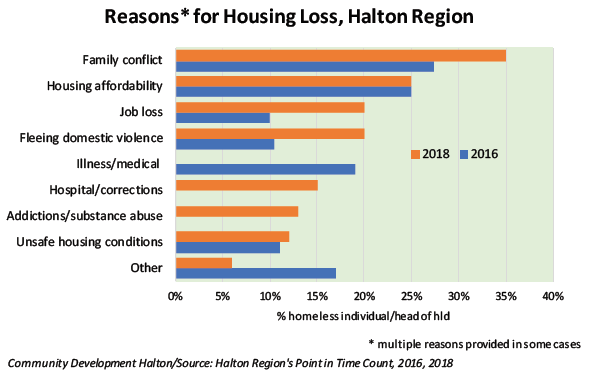 Reasons for “That’s why Ontario invested an additional $202 million in our Homelessness Prevention Program, bringing that annual investment to close to $700 million. We have put in place tangible long term solutions, such as the comprehensive By Name List of people experiencing homelessness, along with information about their needs. We’re also working with our partners to implement a new regulatory framework that protects critical community housing supply, encouraging housing providers to continue offering affordable rents for tens of thousands of households and continue to prioritize survivors of abuse and trafficking for rent geared to income assistance through the special priority policy.
“My ministry is also developing a guide that will help service managers who administer this policy and support survivors so they can access the homes that they need.
“Let me be clear, we are ready and willing to do that work. We will continue working with AMO and all of our partners to create a stronger future for our remarkable province.”
Now we are able to understand why the Minister was not able to keep in touch with his Chief of Staff who was selecting the properties that were to be taken out of the protected land within the Greenbelt – he was a very busy cabinet Minister.
During the twenty minute oration the Minister never once uttered the word “Greenbelt”.
There were reports that Minister Clark was booed at one point during his remarks.

 By Joe Gaetan By Joe Gaetan
August 28th, 2023
BURLINGTON, ON
Much lamenting has taken place over the fact Burlington no longer has ECOB. ECOB had its time and place and was effective at the time. However different times require different methods.
A “Shadow Cabinet” is a feature of our Westminster system of government composed of opposition spokespeople who form an alternative cabinet to that of the sitting government.
The members shadow or mirror each position of the Cabinet. Members of a shadow cabinet have no executive power but can serve to hold a government to account. More importantly they demonstrate to the current government that someone is watching.
So, why not a “Shadow Council”?
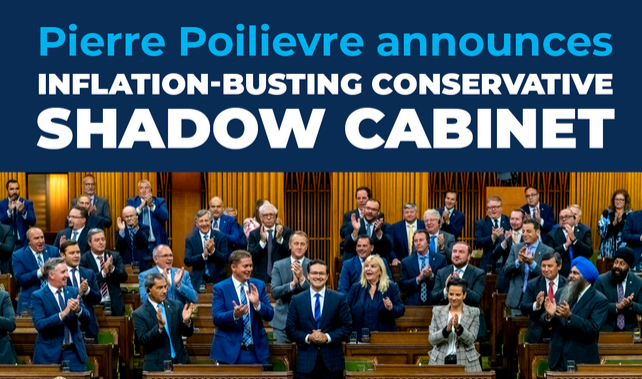 Shadow Cabinets are a common feature at the federal level. Why not at the municipal level. The benefit to the electorate of a shadow council is, the public would then have someone other than elected officials looking out for their best interest. The concept would require interested parties to come together under a formal arrangement whereby one or two people would shadow each member of council.
This would entail shadowing council meetings, ward communication sessions and other events that incumbents frequent. A shadow council would need to come together under a prescribed format that includes reporting back to the electorate. This of course would have to be done using the same communication methodologies and tools that our current council use to get their message out.
The Shadow Council approach has two benefits.
One being voters would get an “opposing” view of what is going on in our City.
Two, our system of democracy would be enhanced as those involved would benefit from the needed exposure. As it stands the “incumbent effect,” makes it almost impossible to unseat an incumbent. The time and effort required to do this would be something to consider.
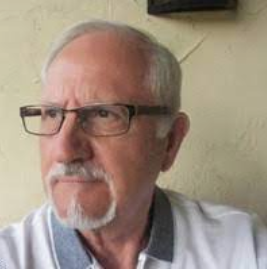 Joe Gaetan On the other hand, if you are not satisfied with the status quo or aspire to unseat the Mayor or Councillor, what are the alternatives?
None that I can see that are viable.
Joe Gaetan is a frequent commenter on civic issues.

 By Pepper Parr By Pepper Parr
August 27th, 2023
BURLINGTON, ON
How do I get involved?
Who makes the decisions?
And how can I be a part of that group that makes the decisions?
It’s not quite that simple – but it isn’t really all that difficult.
At this very moment the province of Ontario is going through a very difficult time.
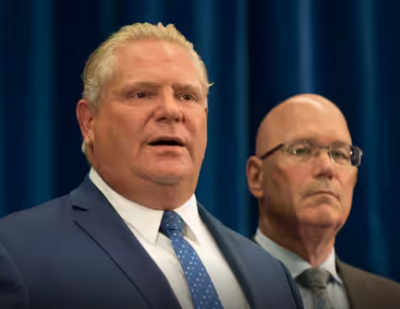 Premier Doug Ford with his Minister of Municipal Affairs Steve Clark The Premier of the province has let a situation get out of hand. Did he collude with a group of developers to permit some of the land they owned within the Greenbelt boundary to take the land out of the boundary so that it could be used to build much needed housing or did he genuinely not know what was going on in one of his Ministries? There are widely different opinions on that issue with many, maybe a majority at this point, calling for the Premier and Minister of Municipal Affairs and Housing to resign.
The Premier certainly isn’t going to resign and given that the next provincial election is three years off – his job isn’t at risk. The Minister of Municipal Affairs might manage to hang on for a month or so, but my opinion is that his days are numbered.
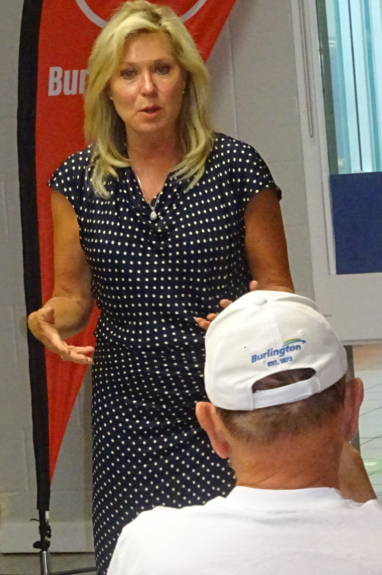 Bonnie Crombie, a leadership candidate, speaking to Burlington Liberals. To maintain that he wasn’t aware of what his Chief of Staff was doing is reason enough for him to resign.
While all this is going on with the government of the day, the provincial Liberal Party is in the process of deciding who the next leader is going to be. There are currently five people, four men and one woman in the race to be leader.
The voting for a new leader will get made late in November.
But today, Sunday August the 27th you, anybody for that matter, can become a member of the Burlington Provincial Liberal Association.
Live in the riding and be at least 14 years of age.
The closing date for new members is September 11th. If you want to join – fill in the form using this link. There is no fee
You will get a regular stream of information and you will be asked to donate. You don’t have to.
You will get to hear from all the candidates.
That is how you get involved; that is how you become one of the decision makers.
Each of the political parties has a membership program. At the moment the Provincial Liberals are the only ones with a very active program.

 By Pepper Parr By Pepper Parr
August 27th, 2023
BURLINGTON, ON
We recently published a report on the return of the Covid19 virus.
We are getting information now that the return is dangerously high at some of the Long Term Care Centre’s (LTC)
The COVID protocols have been relaxed in the past several months in LTC province-wide when virus reports decreased.
COVID19 has returned to the LTC and retirement homes in disturbingly high numbers. We now have community with almost no masking, and free test kits are not easy to come by, there is the sense in the minds of many that COVID is over despite the science showing it isn’t. It is not surprising that this will hit LTC and retirement homes first and hard again.
On Wednesday August 23 we got notice that there is a COVID outbreak declared by Public Health:
2nd floor of the West building Tansley Towers – 3 cases and a suspected outbreak on first floor of East building (they did not say numbers for that one). Considering the data we got later, I suspect it was one case.
So a total of 4.
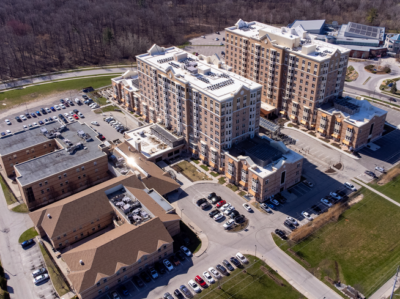 The two towers at Tansley Woods Thursday August 24: the number was 15 cases total, with multiple declared outbreaks:
East building:
1st floor – 1 case
3rd floor – 1 case
4th floor – 1 case
6th floor – 1 case
10th floor – 1 case
West building:
1st floor – 1 case
2nd floor – 5 cases
6th floor – 1 case
8th floor – 2 cases
9th floor – 1 case
Friday August 25: 18 cases total. They are now cancelling some outings and activities and having staff on affected floors wear masks.
For some reason, they seem to be highlighting hand washing as being the main way to stop infection spread, with no mention of air filtration or mandatory masking for all. They do suggest getting vaccines if able, to protect our most vulnerable.
East building:
1st floor – 1 case
3rd floor – 1 case
4th floor – 1 case
6th floor – 1 case
10th floor – 1 case
West building:
1st floor – 1 case
2nd floor – 6 cases
6th floor – 1 case
8th floor – 4 cases
9th floor – 1 case
Saturday August 26: 25 cases total. All staff masking now. Mandatory masking for visitors on outbreak floors.
East building:
1st floor – 3 cases
3rd floor – 2 cases
4th floor – 1 case
5th floor – 1 case
6th floor – 1 case
10th floor – 1 case
West building:
1st floor – 1 case
2nd floor – 8 cases
6th floor – 1 case
8th floor – 5 cases
9th floor – 1 case
The numbers at the Brant Centre are quite a bit lower but it is clear that the virus has returned and is impacting those who are most at risk.
Some Personal Care Workers are still working at two institutions at the same time – they need the income.
Much stronger defensive members are called for – but that does not appear to be happening.
The most recent results (August 24th) from the Office of the Medical Health Office are:

Prompt decisive action is needed when this kind of data is available. The last thing any community needs at this time is another outbreak.
Start wearing masks and be careful when you are in large group settings.
Regional Medical Office of Health do not maintain staff on the weekends. We will try them on Monday for a comment.

 By Staff By Staff
August 26th, 2023
BURLINGTON, ON
The Royal Canadian Mounted Police is investigating the Ford government’s handling of the Greenbelt after receiving a referral from the Ontario Provincial Police.
The RCMP has confirmed that it will be looking into “irregularities in the disposition of the Greenbelt surrounding Toronto.”
“We will review and assess the information received and will take appropriate action as deemed necessary,” the RCMP said in a statement. “As the investigation is in its infancy and is ongoing, we decline to offer any further comments.”

The news comes two weeks after a scathing report from Auditor General Bonnie Lysyk found that the manner in which the provincial government chose to remove land from the Greenbelt was “not transparent, objective, or fully informed,” and showed “preferential treatment” to certain developers.
The 95-page report found that Ryan Amato, Housing Minister Steve Clark’s Chief of Staff, was heavily influenced by suggestions from developers as to which lands should be removed — of the 15 sites that were selected for removal, 14 were put forth by Amato.
Amato resigned on Tuesday. Ford has insisted that “no one had preferential treatment” in the land swap that will see 7,400 acres of the Greenbelt removed for housing development, and 9,400 acres of protected land added elsewhere.
Lysyk’s report made 15 recommendations, 14 of which the province has said it will move forward with. The one it will not implement is the recommendation to re-evaluate its decision to change the Greenbelt boundaries and open the land up to housing development.
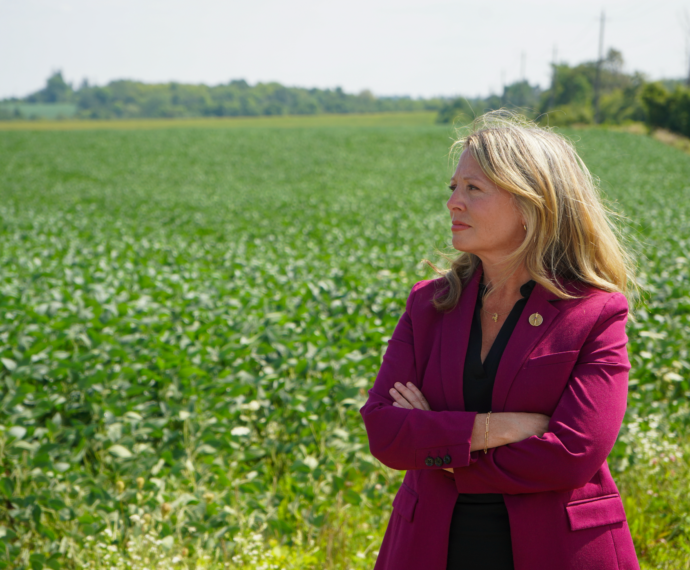 Leader of the Opposition Marit Stiles standing in a field of soybean plants in the Greenbelt Photo courtesy NDP Marit Stiles, Leader of the New Democrast Opposition has to be given credit for writing the provincial Auditor General asking that there be a “value for money” review of the decisions the province made on Greenbelt properties.
When the report was made public Stiles did more digging and found that there were other people involved in providing information to the developers.
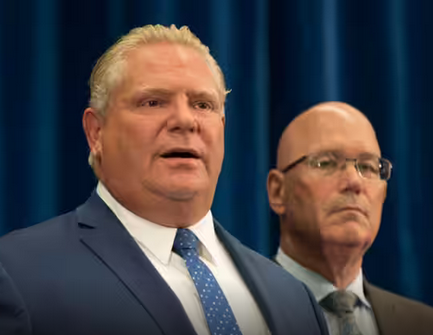 Premier Doug Ford with Minister of Municipal Affairs and Housing: Keeping a brave face. The Premier said “no one had preferential treatment” and the Minister of Housing and Municipal Affairs said he wasn’t aware of what his Chief of Staff was doing.
Someone is either really incompetent or has a very very long nose.
The public is hoping the Mounties prove to be very competent – which might be a stretch for some people.
Big question going into next week is – how much longer will Minister of Municipal Affairs Steve Clarke be in Cabinet?
Related news stories:
Premier gives his side of the story.
Tip sheet

 By Staff By Staff
August 26th, 2023
BURLINGTON, ON
Following a frenzied spring, back to back interest rate hikes have taken the momentum out of Canada’s housing market rebound. But, despite a forecast of falling prices, affordability is not expected to improve.
Home sales dipped 0.7% month-over-month in July, putting an end to six months of heightened activity. The decline occurred despite a 5.6% monthly increase in new listings, which helped bring balance back to the market.
Although the MLS Home Price Index (HPI) climbed 1.1% from June to July, the pace of appreciation has slowed from the 1.9% average seen over the last three months, a trend economists expect to persist for the foreseeable future.
In a new housing market update from RBC, Robert Hogue, Assistant Chief Economist, and Rachel Battaglia, Economist, predict that price gains will “continue moderating in the months ahead,” as balanced demand-supply conditions reduce upward pressure, and high interest rates trim buyers’ budgets.
“The path ahead for Canada’s market is likely to be bumpy,” Hogue and Battaglia said.
“We expect higher interest rates to keep curbing buyers’ enthusiasm for months to come, while possibly forcing the hand of some current owners to sell.”
The expectation of stagnating prices, and continuously high interest rates, was shared by Robert Kavcic, Senior Economist and Director of Economics at BMO, in a recent economic publication. With interest rates remaining high, so too will mortgage rates.
The July Consumer Price Index keeps the decision for future rate hikes “very much alive,” Kavcic said, and at the very least, it makes the case for interest rates to stay elevated into 2024. As such, any meaningful near-term mortgage rate relief “looks unlikely.”
As Farah Omran, Senior Economist at Scotiabank noted in a housing market update, the number of sales seen in July was aligned with the 2000-2019 average for the month, which indicates a “more sustainable level of housing activity.” However, this “does not mean all is well with Canada’s housing market.”
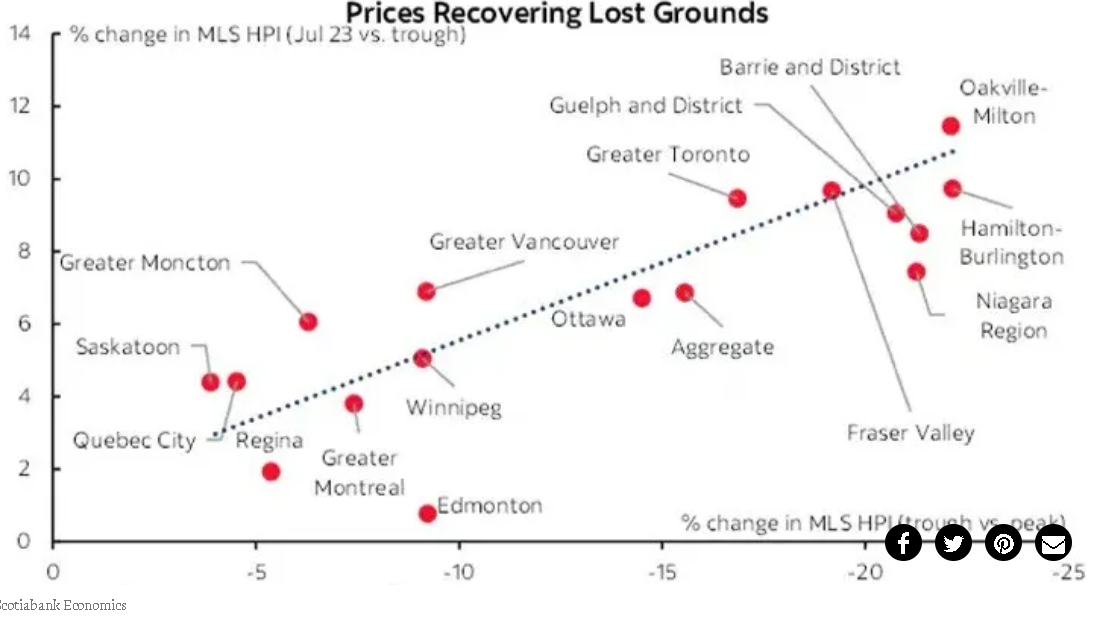
“Affordability remains out of reach for many first-time home buyers and supply continues to lag,” Omran said, adding that July’s price increase reflects “fundamental imbalances in market conditions.”
The cities that saw the greatest price correction over the latter half of 2022 have also seen the largest price increases thus far in 2023, leading to a reversal in any improvements in affordability.
After the Bank of Canada started raising interest rates in early 2022, prices declined approximately 22% in Oakville-Milton, but have since recovered more than 11%. The Fraser Valley experienced a roughly 20% drop following the start of rate hikes; since hitting bottom, they’ve risen about 9%. Meanwhile, in Montreal, home priced declined 7% during the correction, and have recovered less than 4%.
While affordable housing is on the lips of every politician, parent and young person wanting to get into the housing market Ontario does not yet have an affordability definition that everyone can agree upon.
After a three day retreat in PEI the federal government realized that the housing solution is something they are going to have to be part of.
TVO has produced a short video on what Affordable Housing is – time will tell if the province buys into their definition.

 By Staff By Staff
August 26th, 2023
BURLINGTON, ON
It is a whopper of a highway that bureaucrats have been working on since 2007; Called the 413 and the GTA West highway the Transportation people are following Ontario’s process for an Individual Environmental Assessment under the Environmental Assessment Act, which is carried out for large-scale, complex undertakings with the potential for significant environmental effects and major public interest.
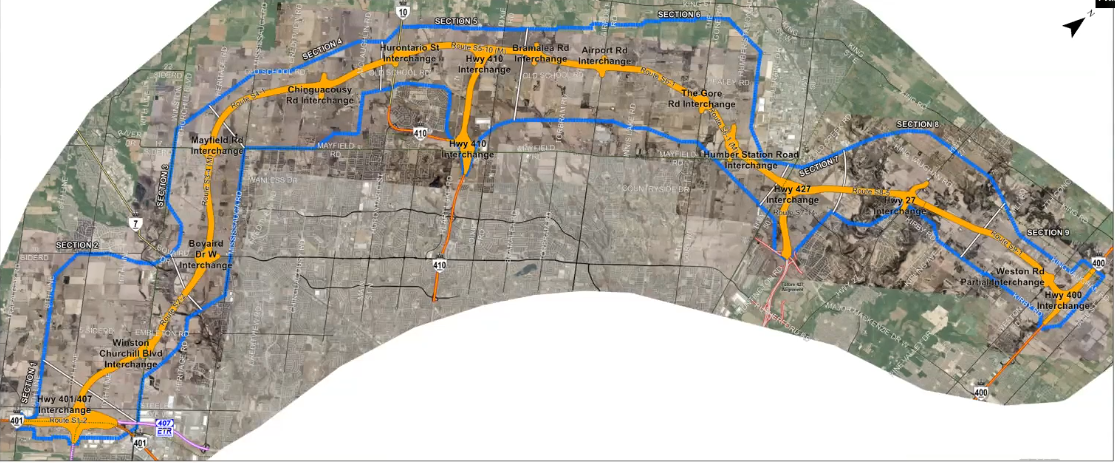
There is loads of information on the Ministry of Transportation website at CLICK here if you are interested.
Some interesting differences with this project; there will be a lane for trucks and there are plans for a lane that would handle passenger buses.


|
|
 By Staff
By Staff















 The matter went before cabinet on November 2, was approved, and after a short 30-day public consultation period, the Greenbelt changes took effect.
The matter went before cabinet on November 2, was approved, and after a short 30-day public consultation period, the Greenbelt changes took effect.




 • The power of Conservation Authorities. Bill 23 compromises Conservation Authorities’ capacity to regulate development that negatively impacts wetlands, rivers or streams and to provide municipalities with guidance on preventing flooding.
• The power of Conservation Authorities. Bill 23 compromises Conservation Authorities’ capacity to regulate development that negatively impacts wetlands, rivers or streams and to provide municipalities with guidance on preventing flooding.


 While individual members of Council have their issues with Commisso – they have not taken any steps to open up the way the city hands out information. They like it the way it is.
While individual members of Council have their issues with Commisso – they have not taken any steps to open up the way the city hands out information. They like it the way it is.
 By Pepper Parr
By Pepper Parr





 By Staff
By Staff































Right on Ian!
After so many years of arrogance and non-representation at City Hall I can now see a way out of this Dark Hole to a future where transparency and electoral representation will rule the day and where there will be OPEN and HONEST discussions rather than the ‘lip service’ that exists today.
Marianne Meed Ward has a long history of fighting for the rights and concerns of ALL the citizens of Burlington and as Mayor she will be in a position to ensure that Council is more focused and held to a higher level of accountability
Join the MOVEMENT!
Kerri: The reality here regards the issue of misrepresentation rather than misinformation as you suggest. Hard to walk this one back for the thousands of voters impacted here as well as those across the city who were stunned to see this unfold.
Congratulations Marianne! Well Done!
We will let the Pearson and Bateman communities weigh in on this!
gordon: There is no reason what so ever for the Pearson and Bateman communities to hold the decision made by the Director or Education and upheld by the board of trustees against Marianne. The final outcome of those difficult decisions was not her doing. If the folks in those communities choose to believe the slander and misinformation that is thrown about by the representatives of those school communities, well that is very unfortunate. Instead of slander and name calling on social media, perhaps people who have sincere questions reach out to Marianne for a discussion in a respectful manner.
Bob, I am a resident of ward 5 and Marianne has already been in touch about canvassing in this ward. Do you really believe that MMW saved Central H.S. and if so, you have not met the strong parents of the Save Central Campaign. I have had the pleasure of sitting on a committee with MMW and believe me, she will fight for all the residents of our city.
The good people of Burlington deserve a mayor who will represent all of the city not just the downtown interest. I don’t think you’ll find her canvassing the neighborhoods around Pearson and Batemen after that shameful display to save the decrepit building on Baldwin. I would also urge all Burlington residents particularly the lifelong Burlington residents to visit the downtown to see for yourself the councillors riding and ask yourself if this is the Burlington you want
Marianne is not to blame for the disaster that the downtown is becoming; she has fought to protect the historic character of the downtown while encouraging development that is consistent with maintaining that development. She has consistently been voted down by 5 other councillors (while the mayor also voted against some of these developments, my gut tells me he did so after carefully looking around and making sure the development was going to be approved by those 5 councillors).
Mea Culpa. The third line should have read “consisten with maintaining that character”.
Robertt Bateman High School families don’t just live in Ward 5. We are everywhere!! Including Ward 2. I am sure she will find doors closing in her face or not opening at all. Bateman has not forgotten what MMW and Leah Rehnolds did on June 7, 2017.
I’m very happy to hear that Marianne is running; however, I have only one regret about her decision. If the worst happens and she doesn’t get elected as Mayor, then we’ve lost her from Council and Ward 2.
I do hope that not all the proposed development will be stopped.
Great news!!! I believe Marianne will provide the courageous, principled leadership that TRULY engages all constituencies in this City.
We now have a more engaged candidate for mayor.
Thank God!!!!